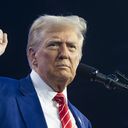Trump meme coin unsettles some blockchain leaders
It's one thing for the new President to support the blockchain industry, but veterans aren't so crazy about him joining their ranks.
Why it matters: The president-elect nominally making $50 billion on a crypto asset that didn't exist a day prior speaks to the industry's power — but there's growing debate within the community about a stain on crypto's burgeoning credibility.
The big picture: Just days before taking office, Trump launched the Official Trump meme coin, sparking immediate questions of whether it could be used as a vehicle to funnel money to the Trump Organization by people seeking to curry favor with the administration.
- That said, it also brought a huge crush of new buyers into the market.
"Crypto changed forever last night," Udi Wertheimer, a blockchain entrepreneur tweeted the next day.
- "I think the Trump coin represents one of the largest events in crypto history, without a doubt," Alon, a cofounder of Pump.fun, the biggest meme coin launching platform, tells Axios in an interview.
Others are more circumspect. "[The President] creating a bunch of meme coins and DeFi protocols opens the possibility to rampant violations of the emoluments clause," Nic Carter, an investor in the space and fan of the new president said on X.
- When the Trump Organization endorsed decentralized-finance project World Liberty Financial back in August, Carter criticized that, too.
Echoing Carter, long-time crypto lawyer, Hailey Lennon, wrote on X, "I don't think Trump knows or cares what the ramifications of his meme coins are besides his short term personal profit."
- And Lee Bratcher of the Texas Blockchain Council put out a statement this weekend saying, "in my subjective opinion it isn't" a healthy development.
- Bitcoin Magazine was more succinct, denigrating the Trump token offering on X. That's despite the fact that its parent company enthusiastically welcomed the then-presidential candidate to Nashville for Bitcoin 2024.
Some are conflicted. "I'm 50:50 on this," Matti, a partner at Zee Prime Capital, tells Axios over Telegram.
- Matti bases his whole investing strategy on the memetic nature of digital assets. He acknowledged the Trump token could make the industry look bad, but added that "it makes you feel crypto is truly part of the zeitgeist."
Meanwhile, Investor Maya Bakhai, general partner at Spice Capital, which has backed a meme trading app, Hype, tries to keep her eye on the retail investor, which she sees as diverging from the crypto illuminati right now.
- To her, the president getting in makes meme coins credible. The negativity we're seeing today from other crypto investors, Bakhai pins on the fact that they missed so much of the meme coin boom.
- Speaking to the financial risks for meme coin traders, Bakhai pushes back on those concerns. "If you think about retail, they know it's a gamble," she says. "They want to gamble."
By the numbers: The energy sparked by the Trump token is showing up on chain. In terms of volume, this has been the best month ever on the blockchain that the token runs on, Solana.
- And it's clearly the new coin that's driving that. Daily volume had been around $4 billion or $5 billion a day through January, but Friday through Saturday were all over $30 billion daily.
- And crypto app downloads are also spiking.
- On the other hand, overall daily volumes across the market look fairly normal still.
The intrigue: While the Trump token unquestionably enriched the President, at least on paper, its launch doesn't seem to have included a special handout to his blockchain fans.
- The meme coin was released at the same time as a party for crypto leaders in D.C. ahead of the inauguration. Sources who were there tell Axios that there was no announcement of the new token at the event.
- In other words, a lot of the best traders were away from their terminals when the token's price was lowest.
What we're watching: It's too early to predict possible political implications from the launch, although the first voices from official Washington are starting to weigh in.
- House Financial Services Committee ranking member Maxine Waters (D.-Ca.) put out a statement Monday saying, "the launch and sale of this coin is yet another reason why all Americans and policymakers should exercise extreme caution on crypto."
- That's notable, as Waters has been a crucial voice on the topic — one that has become tentatively willing to pass legislation in recent years.
The bottom line: The last thing the crypto lobby needs is for Democrats like her to get cold feet.












